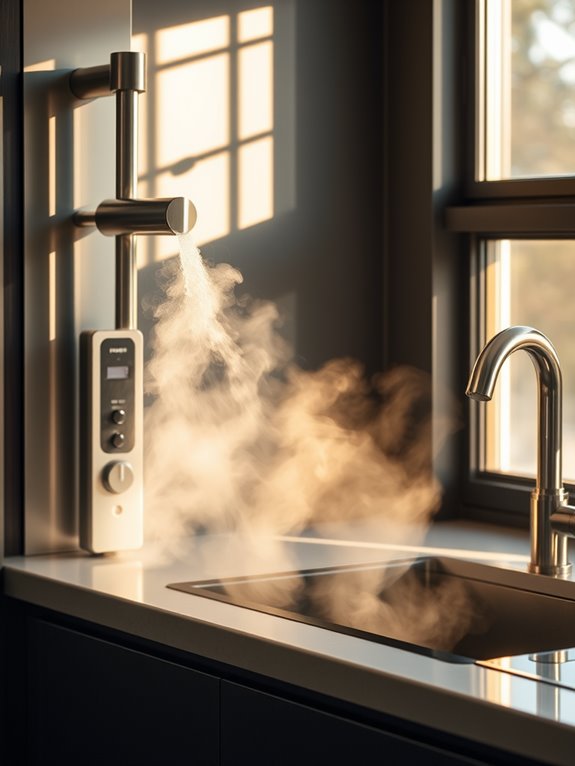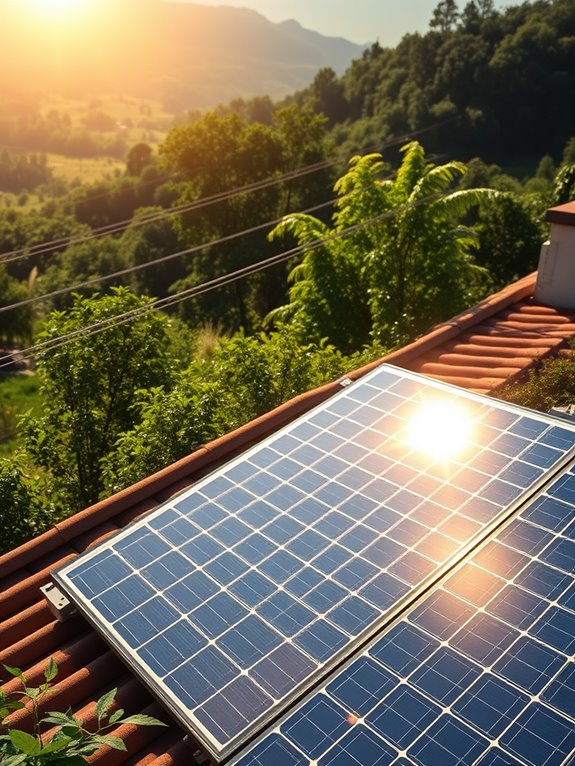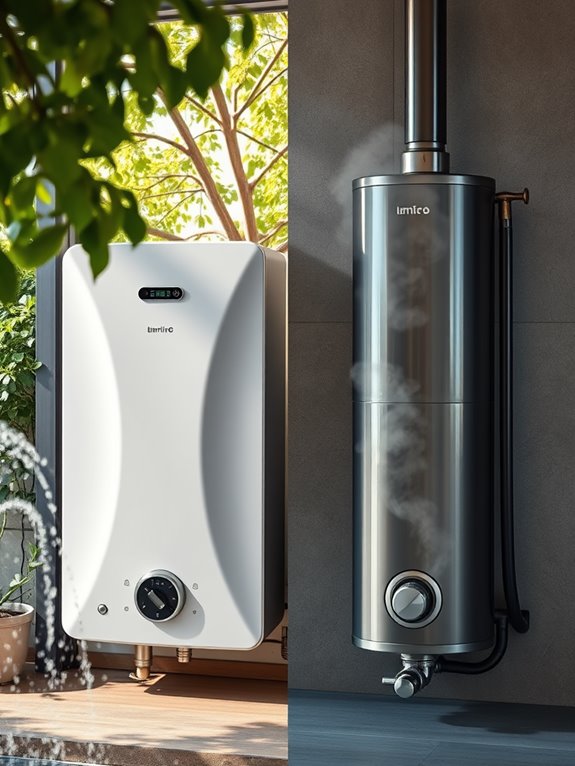Yes, hot water systems can be electric, using electric elements to heat water directly. However, you’ve also got options like gas, solar, and heat pump systems, each with unique benefits. Gas systems heat water quickly and work during power outages, while solar systems harness renewable energy for efficiency and lower bills. Heat pumps use electricity efficiently by moving heat. If you want to know more about these alternatives, there’s plenty more to explore.
Understanding Electric Hot Water Systems

When you’re considering your options for hot water systems, understanding electric hot water systems is essential.
These systems use electric elements to heat water directly, providing a reliable and efficient source of hot water for your home. You’ll find they come in various sizes and capacities, making it easy to choose one that fits your needs.
Installation is generally straightforward, and maintenance is minimal compared to other systems. However, keep in mind that electricity costs can fluctuate, potentially affecting your bills.
Gas Hot Water Systems: An Alternative
If you’re considering options beyond electric hot water systems, gas hot water systems might catch your interest.
They often offer efficiency advantages and can be more cost-effective in the long run.
You’ll also want to think about installation considerations to see if they fit your home.
Efficiency of Gas Systems
While electric water heaters are popular, gas hot water systems often stand out for their efficiency and cost-effectiveness.
They heat water faster, providing hot water on demand, which means you won’t have to wait long during peak usage times. Gas systems typically consume less energy compared to electric ones, translating to lower utility bills over time.
Additionally, they perform well even during power outages, ensuring you have hot water when you need it most.
When considering your options, you’ll likely find that gas hot water systems offer a reliable and economical solution for your home’s hot water needs.
Installation Considerations
Before diving into a gas hot water system installation, it’s important to assess your home’s specific requirements and existing infrastructure.
Check if you have adequate gas supply lines and proper ventilation, as these are vital for safety and efficiency.
You’ll also want to take into account the location—make sure there’s enough space for the unit and easy access for maintenance.
Hiring a licensed professional plumber for installation is highly recommended to comply with local codes and guarantee peak performance.
Finally, familiarize yourself with the necessary permits and regulations in your area to avoid any complications down the line.
Cost Comparison With Electric
When considering hot water systems, understanding the cost differences between gas and electric options is essential for making an informed decision.
Generally, gas systems have lower operating costs compared to electric ones, especially in areas where natural gas is cheaper. You’ll often find that while gas hot water systems may have higher upfront installation costs, they can save you money in the long run due to lower energy bills.
Additionally, gas systems typically heat water faster, which can be a factor if you need hot water quickly.
You might also be interested in: Are Continuous Flow Hot Water Systems Good? Benefits and Considerations
Solar Hot Water Systems and Their Benefits

As you explore options for hot water systems, solar hot water systems stand out for their sustainability and efficiency. By harnessing the sun’s energy, these systems reduce your reliance on fossil fuels and lower your utility bills.
They can notably decrease your carbon footprint, making them an eco-friendly choice. Additionally, many solar hot water systems require minimal maintenance, which saves you time and money in the long run.
Plus, government incentives and rebates can make installation more affordable. Investing in a solar hot water system not only benefits the environment but also enhances your home’s value and energy independence.
Heat Pump Water Heaters Explained
While many homeowners seek efficient alternatives for hot water, heat pump water heaters offer a compelling solution.
These systems work by extracting heat from the air or ground and transferring it to the water, using electricity only to move heat rather than generate it. This makes them remarkably energy-efficient, often providing hot water at lower operational costs compared to traditional electric heaters.
Plus, they can be installed indoors or outdoors, making them versatile for various home setups.
Comparing Efficiency: Electric vs. Other Heating Methods

Though many homeowners rely on electric water heaters for their convenience, it’s essential to compare their efficiency with other heating methods. Here’s a quick look at how they stack up:
| Heating Method | Efficiency Rating | Cost of Operation |
|---|---|---|
| Electric Water Heater | 90% | Moderate |
| Gas Water Heater | 80% | Low |
| Solar Water Heater | 100% | Variable |
Electric heaters are efficient but can be more costly in the long run compared to gas. Solar heaters offer the best efficiency but depend on sunlight availability. Consider these factors when evaluating your options.
Choosing the Right Hot Water System for Your Home
When it comes to choosing the right hot water system for your home, you need to evaluate the various types of water heaters available.
Think about how energy efficiency plays a role in your decision, as it can impact both your utility bills and your environmental footprint.
Types of Water Heaters
Choosing the right hot water system for your home can feel overwhelming, given the variety of options available.
To help you decide, here are four common types of water heaters:
- Tank Storage Water Heaters – These traditional systems store a specific amount of hot water for immediate use.
- Tankless Water Heaters – They heat water on demand, offering endless hot water without the bulk of a tank.
- Heat Pump Water Heaters – These energy-efficient models use electricity to move heat from the air or ground.
- Solar Water Heaters – They harness solar energy, providing a green option for heating water.
Consider your needs carefully!
Energy Efficiency Considerations
As you evaluate your options for a hot water system, energy efficiency plays a crucial role in determining long-term costs and environmental impact. Choosing the right system can save you money and reduce your carbon footprint. Here’s a quick comparison of common systems:
| System Type | Energy Efficiency Rating | Estimated Annual Cost |
|---|---|---|
| Electric Heater | Moderate | $400 |
| Gas Heater | High | $300 |
| Heat Pump Heater | Very High | $250 |
Consider these factors carefully to make certain you select the most efficient and cost-effective solution for your home.
Conclusion
In summary, choosing the right hot water system for your home is essential for efficiency and cost savings. Did you know that electric water heaters can be up to 90% efficient? This means you’re getting more hot water for your buck compared to some gas systems. By exploring your options—electric, gas, solar, or heat pump—you can find a solution that not only meets your needs but also supports a more sustainable lifestyle. Consider your choices wisely!

I’m Allen Kim, the chief editor of plumbinginto. I am a mid level plumber and assign to an local firm over 4 years of experience. During the working period, most of my experience is related to the house plumbing. I learned about the thing, when working with most experienced people in this sector, one must be as good as the inspector or better with knowledge of the project as well as the practical aspects of plumbing industry.